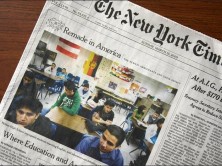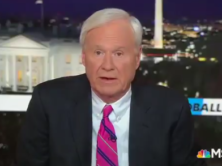
(Credit: Seth Werkheiser via Flickr)
Accusations of plagiarism against author Rick Perlstein were “a political attack … dressed up as a journalistic ethics controversy,” the New Yorker’s Jeffrey Toobin told New York Times public editor Margaret Sullivan.
It was wrong for the Times to report on the accusations without fully vetting them, Sullivan concluded, because it amounted to smearing Perlstein and his new book The Invisible Bridge: The Fall of Nixon and the Rise of Reagan.
“By taking it seriously, The Times conferred a legitimacy on the accusation it would not otherwise have had,” Sullivan wrote. It was also problematic because the accuser, Reagan’s Revolution author Craig Shirley, was a competitor, “the author of a book on the same subject with an opposing political orientation.”
Shirley’s Accusations
Shirley is an author, historian and lecturer, according to his website. He posted a statement on his website Aug. 3 about his claims against Perlstein . He wrote that he read the book to review for Perlstein and found “startling similarities” to his book. Shirley wrote:
“The similarities were not just in historical facts – after all, both works cover the same historical figure and period. Rather, the similarities were in wording, phrasing and expression—nearly fifty in all, according to our initial review of the work.”
Shirley provided 19 side-by-side comparisons of sentences he says are taken from his book. One such example, emphasis ours:
Shirley’s book: “red light district was festooned with red, white, and blue bunting, as dancing elephants were placed in the windows of several smut peddlers.”
Perlstein’s book: “anemic red light district was festooned with red, white and blue bunting, several of the smut peddlers featured dancers in elephant costumes in their windows.”
While that example shows a unique phrase lifted, another example provided by Shirley doesn’t really amount to plagiarism iMediaEthics found.
Shirley’s book: “Adding to Reagan’s woes was the CBS News report that had, for the first time in the network’s tabulations, placed Ford over the top with 1,132 ‘firm or committed’ delegates.”
Perlstein’s book: “CBS News reported that for the first time since it had begun counting, Ford was over the top with 1,132 ‘firm or committed delegates.’”
Shirley’s statement also criticized Perlstein directing readers to read his sources on his website instead of in the book.
New York Times Reporting
The Times‘ Aug. 4 article, “Reagan Book Sets Off Debate,” reported on Perlstein’s book and “commentators who accuse Mr. Perlstein of sloppy scholarship, improper attribution and plagiarism.” The Times wrote:
“The most serious accusations come from a fellow Reagan historian, Craig Shirley, who said that Mr. Perlstein plagiarized several passages from Mr. Shirley’s 2004 book, “Reagan’s Revolution,” and used Mr. Shirley’s research numerous times without proper attribution.”
The Times noted that Shirley’s lawyer had sent “two letters to Mr. Perlstein’s publisher” claiming there were “19 instances of duplicated language and inadequate attribution,” and calling for “$25 million in damages, a public apology, revised digital editions and the destruction of all physical copies of the book.”
Shirley said as of publication there were “close to 50 instances where his work was used without credit,” the Times added.
In response to the claims, Perlstein said “The claim of plagiarism doesn’t fly; these are paraphrases.” He also said that he was “reverant toward my sources.” Perlstein further suggested the charges were politically motivated.
Likewise, Simon & Schuster’s president and publisher denied the accusations.
Public Editor: ‘Standard has to be higher’ in reporting
In her public editor post, Sullivan further quoted the New Yorker’s Toobin as saying Perlstein attributed work consistent with standard. Toobin said:
“As Shirley himself acknowledges, Perlstein paraphrased Shirley’s words and then cited his work. That is not plagiarism; that is responsible behavior by Perlstein. Perlstein did what historians are supposed to do.”
Times deputy media editor Bill Brink defended reporting on the accusations as well as other issues related to the book — like Perlstein “placing source citation not in the book itself but on Perlstein’s website” — as newsworthy. “We did that in the most responsible way possible, and put it in context” Brink told Sullivan.
Further, the Times’ reporter, Alexandra Alter, did examine “19 passages.” But, Alter didn’t review the “50 instances” alleged by Shirley.
Sullivan also said the Times‘ asking Perlstein for comment didn’t fix the problem of reporting on the accusations because it would have amounted to a “he said, she said false equivalency.”
Sullivan added, “The Times article amplified a damaging accusation of plagiarism without establishing its validity and doing so in a way that is transparent to the reader,” she wrote. “The standard has to be higher.”
Times columnist Paul Krugman also blogged Aug. 5 critically of the accusations. He called the accusations “grotesque” and “completely spurious.”
When asked for comment on Sullivan’s column, Shirley wrote to iMediaEthics, “Plagiarism is an important topic for the literary editors to address and the New York Times rightly did so in their original story.”
Shirley again accused Perlstein of attribution issues: “Rick Perlstein and his publisher, Simon & Schuster, chose to publish a book that did not properly give attribution to his sources and lifted dozens of direct quotes from my book without proper citations.” He also asked an interesting question about Perlstein’s online-only citation list for his book: “There is no Chicago style book for online citations and no standard by which anyone who is a writer or historian can judge his work. Who will keep his online site alive in 5 years or 25 years? No one will be able to pick up his book in 50 years and know where he truly got his information. As a historian and writer, it is deeply troubling to me. More than one reviewer has suggested this is deliberate concealment.”
Shirley added,
“Plagiarism is a very serious problem today and for the sake of all writers, the standards must be affirmed. Mr. Perlstein engaged in the same pattern of plagiarism Stephen Ambrose engaged in and for which Simon & Schuster made a settlement. The matter is being properly debated by literary editors as we speak.
“The internal debates within the New York Times are secondary to the issue of plagiarism which is plaguing the literary world and must be addressed for all the future writers and historians.”
IMediaEthics has sent this statement to Perlstein for comment.






